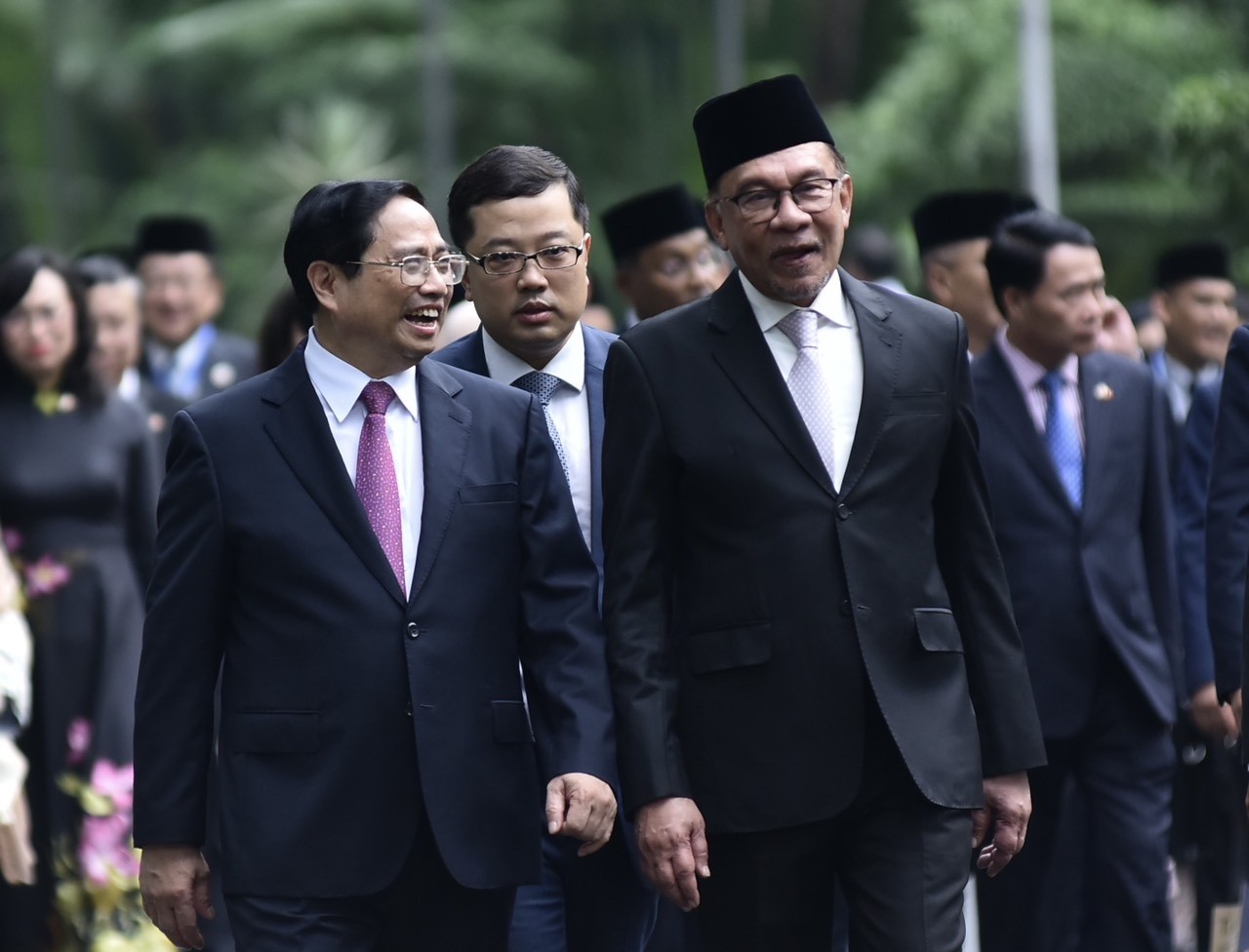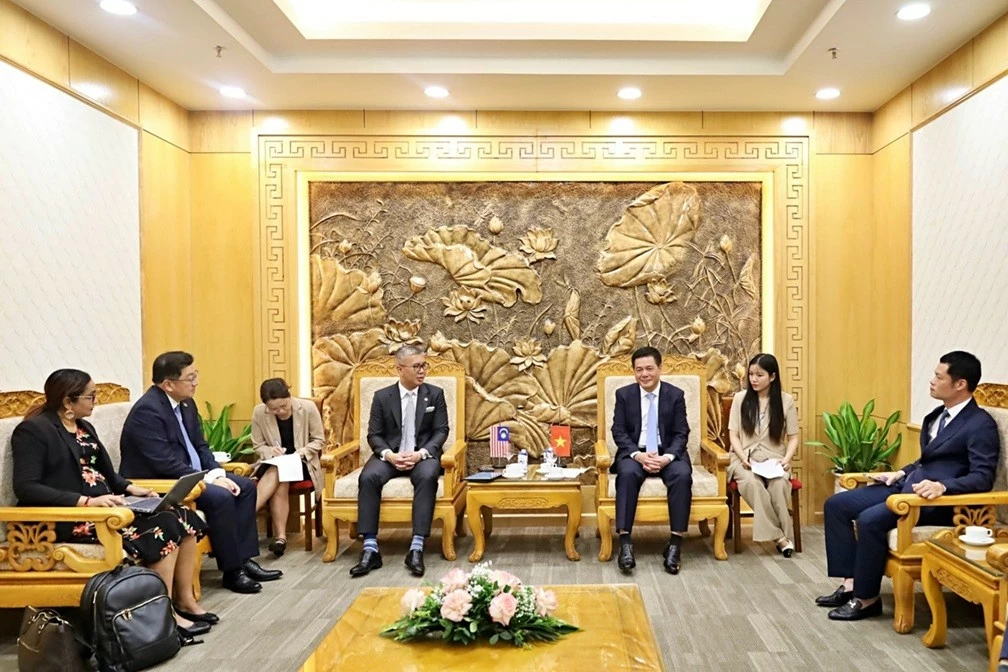
Vietnam's advantages in developing Halal industry: Malaysian Ambassador
Latest
 |
| During the visit of Malaysian Prime Minister Anwar Ibrahim to Vietnam (July, 2023), leaders of the two countries agreed to expand bilateral cooperation in Halal development. (Photo: Nguyen Hong) |
Seamlessly fit into the halal market
These advantages include Vietnam’s strategic location in Southeast Asia, with proximity to prominent Muslim markets such as Malaysia, Indonesia, and Singapore, thereby facilitating easier trade and export opportunities.
Another advantage is Vietnam's diverse agricultural base. The country is rich in a variety of crops and livestock, which, with the right Halal certification processes, can seamlessly fit into the Halal market. This agricultural diversity is a strong foundation for the Halal food sector.
Tourism also presents a considerable opportunity. Viet Nam has already been a favored destination for many Muslim travelers. By further developing halal-certified tourism services and products, Viet Nam can attract even more visitors from the Muslim world, considerably boosting tourism revenue.
Finally, and certainly not least, the government of Vietnam recognises the opportunities of the rapidly growing global Halal market. This expansion is not only fueled by the increasing Muslim population worldwide but also by the growing interest among non-Muslim consumers towards Halal products for their perceived quality and safety standards.
Support from the Vietnamese Government plays a pivotal role in realizing the prospects for developing Vietnam’s Halal industry.
The Government's interest and steps towards promoting Halal certification and production are commendable, including the launch of the project “Strengthening International Cooperation to Build and Develop Vietam’s Halal Industry Until 2030” in February last year.
This support not only facilitates the growth of the Halal industry but also signals to potential investors the country's commitment to tapping into the Halal market.
Tremendous potential for collaboration
There is tremendous potential for further collaboration between Malaysia and Vietnam in the Halal sector.
Malaysia’s Halal ecosystem is a comprehensive and robust framework encompassing various sectors such as food, finance, pharmaceuticals, cosmetics, tourism, and logistics.
Our Halal certification, overseen by JAKIM (the Department of Islamic Development Malaysia), is recognized worldwide for its stringent standards and thorough processes.
On the other hand, Vietnam, with its rapidly growing economy, dynamic workforce, and strategic location in Southeast Asia, is well positioned to become a significant player in the global Halal market.
During the official working visits by our Prime Minister to Vietnam in March 2022 and July 2023, discussions focused on expanding bilateral cooperation in Halal development, logistics, finance and Islamic banking, Muslim-friendly tourism and hospitality, healthcare services, and halal food and beverages.
Malaysia is well-positioned to share its expertise and Malaysian companies can provide capital, technology, and expertise to invest in Vietnam’s Halal industry. Conversely, Vietnamese businesses can explore opportunities in Malaysia, especially in halal food production, cosmetics, and pharmaceuticals.
Vietnamese businesses are encouraged to view Malaysia as a preferred production site; that offers ease of obtaining the globally recognised Halal certificate from JAKIM. This collaboration would be a strategic move to gain quick access to global Halal markets, leveraging on the connectivity that is already well-established with the Halal markets in Southeast Asia.
Another sector that could offer collaboration activities is Halal tourism. Both countries can work together through joint marketing, attracting tourists from Muslim-majority countries, and boosting the tourism sectors in both nations.
The cooperation between Vietnam and Malaysia in the Halal industry isn’t just about capitalizing on each other’s strengths; it’s about creating a symbiotic relationship that stretches beyond borders. Enhancing market access, aligning with international standards, and fostering innovation are just the beginning.
On our part, the Embassy is looking forward to working with our partners and stakeholders in Malaysia and here in Viet Nam, to facilitate such activities and events as business forums, conferences, training opportunities through our Malaysian Technical Cooperation Programme (MTCP) and engaging with Vietnam businesses to participate in our yearly Malaysia International Halal Showcase (MIHAS). This year, MIHAS will be held from September 17-20, 2024 in Kuala Lumpur.
 |
| Minister of Industry and Trade of Vietnam Nguyen Hong Dien received Minister of Investment, Trade and Industry of Malaysia engku Zafrul Aziz discussed many areas of cooperation including the Halal industry, July 2024. (Photo: Cong Thuong) |
Adherence to Islamic principles is key
Entering the Halal market involves building trust with Muslim consumers to ensure products meet Halal standards. Being certified by globally recognized bodies known for their stringent standards enhances consumer trust.
For marketing, clarity in communicating the product’s Halal status and adherence to Islamic principles is key. Utilizing targeted marketing strategies, especially digital avenues and Halal-focused events may improve marketing effectiveness.
It would also be important to forge strong relationships with distributors and retailers specializing in Halal products is critical for market expansion. Collaborating with other Halal industry players, both locally and internationally, boosts capabilities and market presence.
Keeping abreast of global halal market trends, consumer preferences, and regulatory shifts is essential. A commitment to continuous improvement and compliance, guided by consumer feedback and certification guidelines, is crucial.
Malaysia, a leader in the Halal sector, is an excellent collaboration partner. Known for its comprehensive Halal ecosystem covering various sectors and stringent certification standards by JAKIM, Malaysia sets a global benchmark.
The Malaysian Government supports the ecosystem with strategic initiatives like the Halal Industry Development Corporation (HDC) and the Halal Industry Master Plan 2030, focusing on enhancing halal integrity, talent development, and international collaborations. Malaysia welcomes collaborations with partners to further develop the global halal industry; by focusing on each partner’s strength, the aim would be for beneficial cooperation to all.
Opportunities within Malaysia's thriving Halal market
Malaysia, with its substantial Muslim population, presents a burgeoning demand for Halal products across various sectors such as food, cosmetics, pharmaceuticals, and tourism. Vietnamese businesses are in an advantageous position to tap into this market.
The geographical closeness and strong trade relations between Viet Nam and Malaysia simplify market entry processes. Moreover, obtaining a Malaysian Halal certification, which is renowned globally, not only opens doors to the Malaysian market but also to other international Halal markets.
There's a significant opportunity for collaboration with Malaysian companies, which can aid Vietnamese enterprises in quick market penetration thanks to local insights, distribution networks, and an established consumer base.
Furthermore, Vietnam's diverse agricultural and manufacturing capabilities mean it can produce a broad array of halal-certified products, meeting the expansive needs of the Malaysian market.
Success in Malaysia’s Halal market requires a combination of strategic planning and effective resource allocation. Businesses should aim for partnerships or alliances with Malaysian entities to leverage local expertise and distribution networks.
Pursuing Halal certification with due diligence will also be a cornerstone strategy, as will focusing on product differentiation to stand out in a competitive market landscape. Cultivating an understanding of Islamic practices and ensuring total compliance with Halal integrity across the supply chain is vital.
Additionally, adhering strictly to regulatory requirements, planning for efficient logistics and distribution systems, and tailoring products and marketing strategies to meet local needs will be pivotal. With a focused approach to these strategies, Vietnamese businesses can not only navigate the challenges but also capitalize on the ample opportunities within Malaysia's thriving Halal market.




















